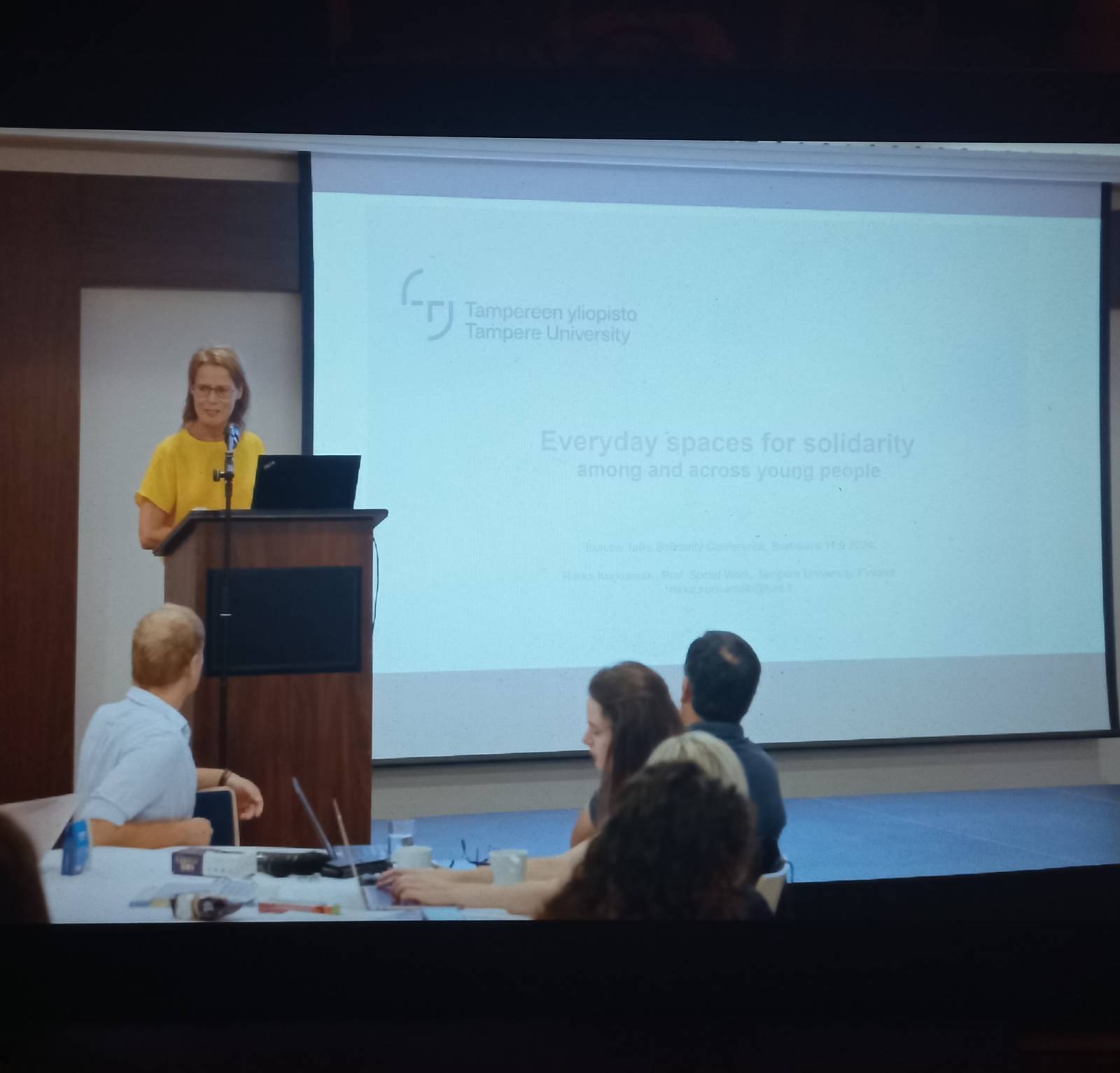Riikka Korkiamäen Europe Talks Solidarity -konferenssissa Bratislavassa viime syyskuussa pitämä keynote-puheenvuoro Everyday spaces for solidarity among and across young people by Riikka Korkiamäki löytyy Youtubesta: https://www.youtube.com/watch?v=EpFo3WnW_OU
Myös konferenssin loppuraportti on julkaistu. Siinä raportin kirjoittanut Aleksandra Mangus tiivistää Riikka Korkiamäen puheenvuoron seuraavasti:
Professor of Social Work, Riikka Korkiamäki shared her insights on solidarity, drawing from personal and professional experiences. She opened her keynote with the story of herself working with marginalised girls in the early 2000s, noting how, despite frequent conflicts among them, a tragic event—the death of a group member’s brother—united them in a display of mutual support. This profound moment of unity made the professor reflect on the concept of solidarity, though at the time, they hadn’t explicitly considered it as such.
Riikka then explored the evolving notion of solidarity, particularly in today’s fragmented, diverse society. She contrasted conventional solidarity, which assumes shared values and common backgrounds, with the current complexities young people face. Today, young people are often placed in social environments — schools, neighbourhoods — where they don’t necessarily share common values or backgrounds. Unlike in the past, when communities were more homogeneous, young people now belong to multiple, diverse social groups simultaneously. This challenges traditional understandings of solidarity, which often expect people to bond based on similarities.
Riikka emphasised that solidarity may not always be based on positivity or inclusivity. It can also polarise, as group identities formed in communities often delineate an ”us” versus ”them.” This duality can unintentionally reinforce inequalities, with solidarity among some leading to the exclusion of others.
Then the discussion shifted to contemporary perceptions of solidarity, particularly among young people. Riikka highlighted how young people’s engagement with solidarity can differ from the expectations adults place on them. While there is a desire for young people to engage in activism or support causes like aiding disabled individuals, she questions whether this coincides with the majority of young people’s interests in their customary everyday life. Hence, her team’s research project ”Solidarity in Practice” seeks to explore how young people define and enact solidarity in everyday settings, particularly in schools, public spaces, and online.
Through research involving storytelling exercises, the team identified various forms of solidarity among young people. The first is “preexisting solidarity”, where alliances are formed with familiar individuals like friends and family. However, the most prominent form was “reflexive solidarity”, which involves building new alliances based on interdependence and diversity. This form of solidarity prioritises individuals with different skills and backgrounds, as young people rationalise the need for a diverse group to create a functioning community.
Another key type identified was “affective solidarity”, emerging from struggles and negotiations between alignment and misalignment, often motivated by negative feelings like distrust or vulnerability. These forms of solidarity underscore how difference and adversity can, counterintuitively, foster stronger bonds. Finally, Riikka introduced “spatial solidarity”, where unity arises simply from sharing a common space, rather than shared values or goals. This suggests that solidarity can emerge from proximity and shared experiences, even if individuals have different perspectives.
In conclusion, Riikka emphasised that solidarity is multifaceted, shaped by both positive and negative emotions, and does not always rely on shared values. There is potential for solidarity in diverse settings, and understanding these dynamics is crucial for developing effective social work practices with young people.
Koko raportti on luettavissa osoitteessa https://www.talkingsolidarity.eu/wp-content/uploads/2024/11/ETS-2024-Conference-Report.pdf

